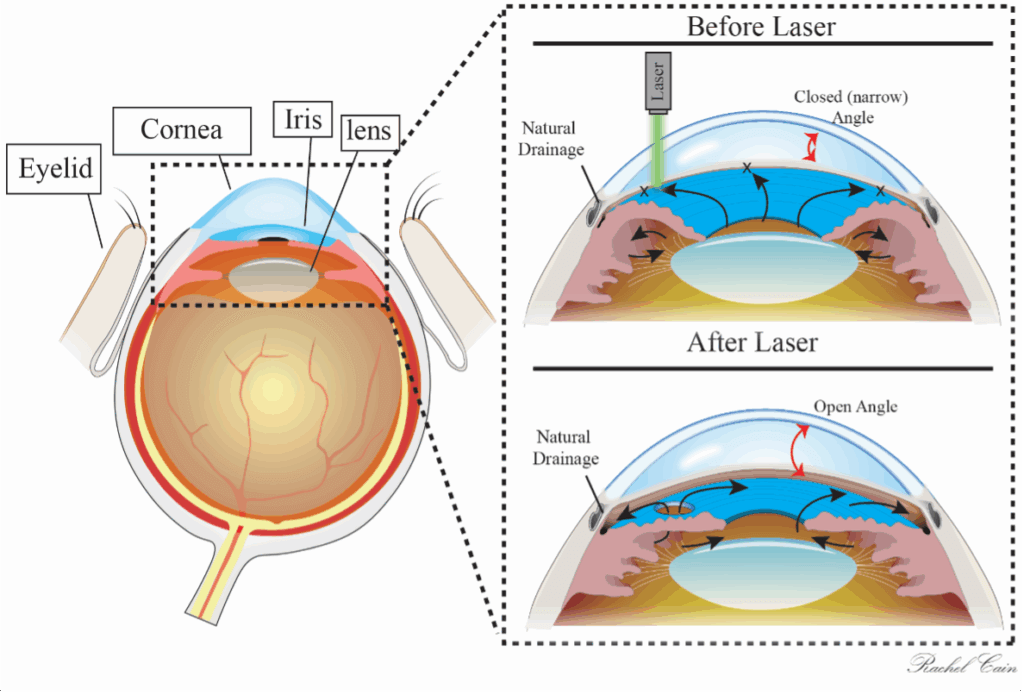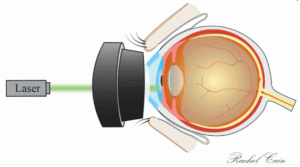Laser Peripheral Iridotomy (LPI)
A Laser procedure for narrow angle and closed angle glaucoma.
Call Us: 215-928-3197
A Laser procedure for narrow angle and closed angle glaucoma.
Call Us: 215-928-3197
What is LPI?
LPI is a laser procedure performed in the office to prevent or treat closed angle glaucoma.
What is angle closure glaucoma?
The drainage site is found within the "angle" where the iris (the colored part of the eye) and the cornea (the clear covering forming the front of the eye) meet. Angle closure is when the natural flow of fluid inside the eye is blocked near the drainage site of the eye by the colored part of the eye (iris). This causes a buildup of fluid within the eye leading to high eye pressures, irreversible damage to the optic nerve and permanent vision loss. In some patients, the eye pressure elevation may happen suddenly causing pain, red eye, blurred vision, nausea and rarely vomiting. This condition is called acute attack of angle closure.
How does LPI work?
A tiny opening is created in the iris (the colored part of the eye) to help widen the pathway to the drain of the eye. This greatly reduces the chance of the drainage pathway closing, which prevents rapidly increasing eye pressures, irreversible damage to the optic nerve and permanent loss of vision.
Who needs an LPI?
Those who have been told by their doctor they have a narrow angle or have early signs of closed angle glaucoma.
What should I expect if I have an LPI?
Your treatment will happen in a specially equipped laser room in the clinic. Once you have been checked in and settled comfortably, drops will be used to numb your eye(s) and check the pressure. No injections or needles will be used.


How often will I be seen after the laser procedure?
You will see your doctor about 2 weeks after the laser for the first visit and your physician will tell you about your next visits.
What eye drops will I use after the laser procedure?
Steroid drops will be prescribed to alleviate any soreness or inflammation inside your eye(s).
Can I stop my glaucoma drops after the laser procedure?
Your doctor will tell you which drops to continue using and how often after the laser procedure. Sometimes patients are able to reduce the number of eye drops they are taking. Even if you are taking the same glaucoma medications after the procedure, the surgery is a success if your pressure is lower.
Will my vision improve after the laser procedure?
This laser is for lowering the eye pressure and will not improve your vision.
What is the recovery time and what should I expect?
Though everyone heals differently, most people can resume normal activities right after treatment, although you'll need to have someone drive you home. For the next few days your eyes may be red, a little scratchy and sensitive to light if you develop inflammation in the eye after the procedure
Will LPI cure my glaucoma in those who have glaucoma?
The simple answer is “No.” Glaucoma is a chronic disease that requires constant monitoring and treatment. The LPI procedure may help to lower your eye pressure and widen the drainage angle. However, it will not reverse any loss of vision that has already occurred.
What are the risks of LPI?
Although LPI is very safe, there are no medical procedures with zero risk. Serious complications such as losing vision are extremely rare. The main risk of an LPI is that your iris may be difficult to penetrate, requiring more than one treatment session. Rarely, the laser spot in your iris may close requiring another procedure to open it again. Glare or visual disturbance, although uncommon, can occur in some patients.
Symptoms often decrease with time and rarely require intervention. Lastly, the pressure in the eye may increase shortly after the laser. This typically can be controlled with pressure lowering eye drops and goes away on its own. It is extremely rare needing a surgery to lower the elevated eye pressure after LPI.
For more information, please see:
Wills Eye Hospital website: www.willseye.org/glaucoma
American Academy of Ophthalmology Patient Information website: https://www.aao.org/eye-health/diseases/what-is-glaucoma
